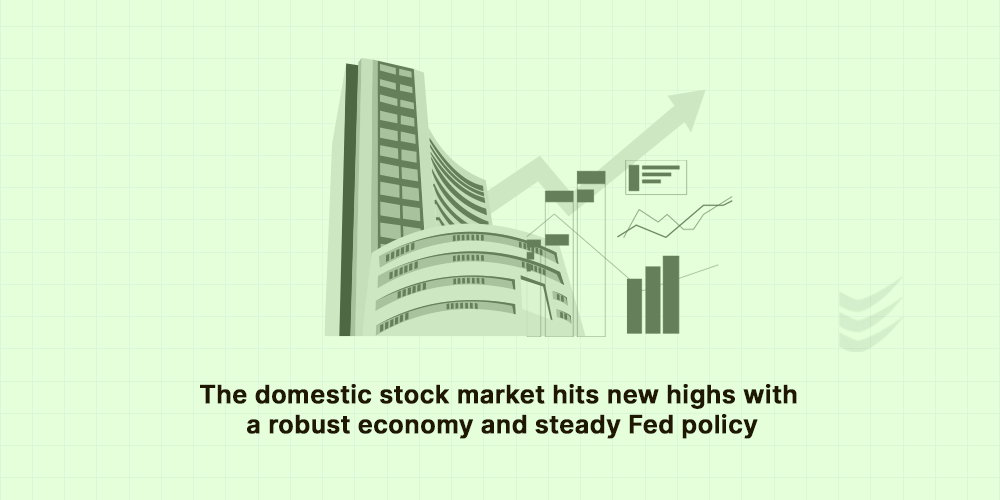Domestic Stocks Hit Record Levels on Positive Economic Data and Consistent Fed Rate
Introduction
The stock market recently started moving up and up in mid-June as the recent figures provided by the economy are still positive and affirmative, proving that India has stable economic growth. Today, the major equity indices of India, namely the Sensex and the Nifty 50, saw the early trading session hit a record high. The BSE Sensitivity reached up to 77,145 and the Nifty 50 passed the 23,481 point mark. After a level decline on the day of the election results, the market has been scaling new heights in the last two weeks, indicating investors’ faith in the NDA government and its policies. The current market upswing can be largely attributed to the release of upbeat economic data and Federal Reserve conclusions to hold the current interest rate intact. Below are more details on the factors that have led to the uplift of the stock exchange market.
Insights of Economic Data
The primary catalyst for the market's recent surge has been favorable inflation data, particularly the significant drop in Consumer Price Index (CPI) inflation. In May 2024, CPI inflation fell to a 12-month low of 4.75%, marking the lowest level seen over the past year. This decline in inflation is a major turning point for the market, as it suggests that the Reserve Bank of India (RBI) may have room to lower interest rates in the upcoming Monetary Policy Committee (MPC) meeting scheduled for August. Lower inflation not only reduces production costs and boosts profit margins for businesses but also stimulates consumer demand and overall economic growth. Additionally, predictions of an adequate monsoon have helped to ease inflationary pressures by ensuring stable agricultural output.
Investors were also buoyed by the positive Industrial Production Index (IPI) data, which showed a 5% increase in April. This growth was primarily driven by a remarkable 10.2% rise in electricity production and a 6.7% increase in mining activities, reflecting robust industrial performance and reinforcing confidence in the economic outlook.
Implications of Fed's Rate Decision
In addition to positive domestic economic data, the market also received a boost from the Federal Reserve's decision to keep interest rates unchanged in its meeting yesterday. The Fed acknowledged that while inflation has decreased, it still remains a significant concern. As a result, they opted not to cut rates for now but hinted that a rate reduction could be on the table by the end of the year.
This decision has made India’s equity market more attractive to foreign investors, who had been pulling out their investments due to political uncertainties earlier this month. Yesterday, foreign portfolio investors (FPIs) reversed course and bought Rs. 57.02 crore worth of equities, providing another lift for the domestic market and contributing to today's surge.
Sector Performance
With market sentiment riding high today, most sectoral indices are trading in the green. Leading the pack are the real estate and IT sectors, both of which are showing significant gains. The positive Industrial Production Index (IIP) data has particularly fueled the rally in the real estate sector, highlighting strong growth in April and the first quarter of 2024. The data points to a robust increase in both demand and supply within the real estate market this year.
Conclusion
The Indian stock market is experiencing a significant surge, bolstered by the stability of the current government, which has helped ease political uncertainties. This political stability is attracting foreign investors back into the market. Additionally, supportive Fed policies and strong economic data continue to drive the market upward, contributing to sustained positive momentum.
Frequently Asked Questions
-
What factors are driving the Indian stock market to achieve new highs?
The Indian stock market is hitting new highs due to a combination of strong domestic economic data, such as a significant drop in inflation and robust industrial production. Additionally, the Federal Reserve's decision to keep interest rates steady has made Indian equities more attractive to foreign investors, boosting market confidence.
-
How has the Federal Reserve's policy impacted the Indian stock market?
The Federal Reserve's decision to maintain its current interest rates has had a positive impact on the Indian stock market. This steady rate policy has alleviated some global economic uncertainties and encouraged foreign investors to invest in Indian equities, contributing to the market's recent surge.
-
What sectors are leading the market rally?
The real estate and IT sectors are leading the current market rally. The positive economic data, particularly the strong Industrial Production Index, has significantly boosted these sectors. The real estate sector, in particular, has seen robust growth in both demand and supply, reflecting investor confidence.
-
What role does inflation data play in the market's performance?
The recent decline in CPI inflation to a 12-month low of 4.75% has played a crucial role in the market's performance. Lower inflation reduces production costs and boosts profit margins, leading to higher consumer demand and economic growth. This favorable inflation data has been a key driver of the market's upward trend.
-
How have political factors influenced the market?
Political stability, particularly the continuation of the current government, has helped ease political uncertainties and attract foreign investors back to the Indian market. This stability, combined with favorable economic data and steady Fed policies, has significantly contributed to the market's positive momentum.

